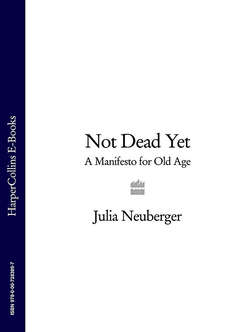Читать книгу Not Dead Yet: A Manifesto for Old Age - Julia Neuberger - Страница 18
Don’t make assumptions about my age
ОглавлениеEnd age discrimination
Whatever you haven’t done by your ninetieth birthday, you aren’t going to do. Ever. Matron won’t let you. And at almost every hundredth birthday the star of the show is a little old lady in a paper hat wondering why all these strangers are singing to her. I simply refuse to believe that nonagenarians enjoy watching the All New Scooby Doo Show in the communal lounges every Monday afternoon. So let’s see them on Saga outings bungee jumping until they reach the end of a long innings.
Dr Mark Littlewood, The Times, 6 August 2005
It had increasingly struck me that old people just get swept under the carpet and out of sight. Whether it’s the half million living in care homes or the 3.5 million living alone. We really wanted to make old people visible again, and push them right back into the heart of society. What better way than to try and break them into the pop charts.
Tim Samuels, the documentary maker behind the rock band The Zimmers, BBC News, 28 May 2007
My father had heart disease for thirty years and, towards the end of his life, he found himself back in hospital at the point of death every 48 hours, suffering from chronic heart failure. As the sickness progressed, he kept finding himself at the distressing point where he could die at any moment. Eventually I had a conversation with his consultant, a lovely man called Dr Tom Evans at the Royal Free Hospital, who said: ‘We could patch your father up again and he might get a bit longer, more like days or weeks rather than months, but I don’t think it would be a kindness, because his suffering is getting much worse.’
He asked me whether he should tell my father this or whether I should. I chose to do so and it was a very difficult conversation. But I found that, although my father was very upset, he basically agreed. This was partly because of a sense that his generation shared that they had a finite claim on scarce health resources, but partly because each intervention was getting increasingly unpleasant. His inability to breathe was terrifying, and he was frightened of suffocating, and gradually becoming unable to do anything except feel increasingly angry at the situation he was in. The drugs were also having increasingly extreme side-effects. He itched all over, scratched himself raw, bled profusely and was desperately uncomfortable. He was also in a wheelchair going in and out of hospital. It was getting very distressing for him.
He was a feisty character and they could have kept him going longer, but we had a good doctor who decided – with my father – not to do so. My father could have disagreed, but in the end it wasn’t an issue about the capabilities of medical science. It could have kept him alive a little longer, but for what?
That question – for what? – is at the heart of this chapter. This is not about euthanasia or killing people. It is to say that people need to have a sense of what kind of life they want, and just putting people back together for no purpose is not a kindness and, as I wrote in my last book – The Moral State We’re In – we have become unkind in society because we have become so mechanistic. The question is increasingly ‘Can we do it?’ when it ought to be ‘Should we do it?’
We can keep a lot of older people going for a long time with a very low quality of life. But the question of whether to do so should be discussed with them, so that when we treat them we do so with dignity and we understand their individuality and differences. If we don’t do that, then professionals assume things on our behalf – either that we should be endlessly revived in the final days and weeks of our life, or that we could not possibly be enjoying ourselves and should not be treated at all. The danger then is that statistical assumptions will be made about our lives that decide officially and on our behalf whether our lives are worth living. There are many things that make life worth living, but we are increasingly allowing health economists – with their averages and statistics – to decide for us, and that is the root of a very serious unkindness indeed.
